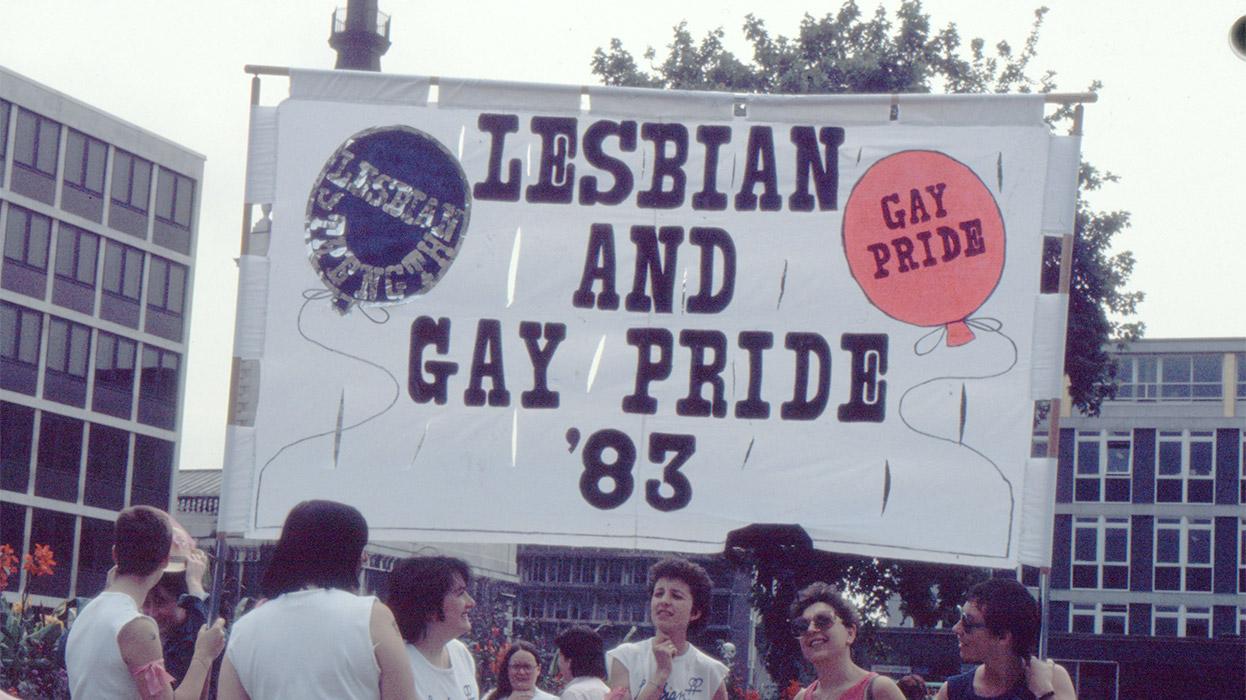Goldsmiths announces world-first MA Queer History and National Queer Archive vision
Primary page content
Goldsmiths, University of London is launching a world-first postgraduate degree in Queer History, beginning in 2017. The university is also in discussions about the creation of a National Queer Archive.

1983 London Lesbian Strength March - AlisonW
A small number of other universities in the UK offer postgraduate qualifications in gender, sexuality and culture, while some US institutions offer Queer Studies, often as a minor or as classes incorporated into Gender Studies degrees.
Goldsmiths is the first university to offer a specialist MA in Queer History.
Goldsmiths aims to develop a centre of excellence for research in the field and to become the global name for the study of Queer History.
The university’s long-term vision is the creation of a fully accessible National Queer Archive in south London, involving MA and PhD students in the process.
Planning for this essential repository of primary material is in its early stages. An archive would provide a much-needed launch pad for a new generation of academics focusing on queer issues, and play a vital role in disseminating knowledge.
Symbolically, it will help rescue from obscurity a neglected history that has so often been denied legitimacy.
Led by Professor of History Jan Plamper, the new MA in Queer History introduces themes and research methods in Queer History and lays a solid foundation in the wider discipline of history.
The programme, based in the Department of History and launching in September 2017, will dissect historically binary categories, such as male/female, heterosexuality/homosexuality, active/passive, and uncover the processes through which these categories came to be seen as ‘natural’.
It also focuses on questions of power, including how sexual orientation and race throughout history have often become interlinked in asymmetrical, oppressive ways.
The MA will mainly explore the Early Modern and Modern periods, and includes classes on the nature of homosexuality in mid-Victorian Western society, and emancipatory movements (especially of the post-1969, post-Stonewall period).
Dr Vivienne Richmond, Goldsmiths Head of History, comments: “The Department of History at Goldsmiths has long pioneered the study and understanding of past societies through their belief systems and their attitudes to subjects such as love and the body.
We teach issues, themes, and controversies so that students can study not only the linear aspects of traditional history but also concepts. Queer History is a natural extension of our work.
“The persecution of LGBTQ people in many parts of the world is acute and worsening, despite huge strides in equality elsewhere. Such injustice is fed by ignorance and there is an urgent need to counter this through insight and understanding. Alongside the imperative to confront prejudice with fact, is also a responsibility to celebrate and commemorate.”
Professor Plamper, course convenor, continues: “Through the study of history we can observe how LGBTQ narratives have developed across time, and critically explore the roots of the community. This helps build an understanding of one’s own story and identity in the present for those who consider themselves queer, but it also raises consciousness in everyone else.
“Developing self-confidence through knowledge is a powerful antidote to both subtle and not-so-subtle oppression.
“Scholarship should be at the vanguard of this, yet Queer Studies remains ‘closeted’ or indeed has been quashed at other institutions. A centre of excellence for the study of Queer History is very much overdue.”
Applications open in October 2016 for students wishing to begin the course in September 2017.
Visit www.gold.ac.uk/pg/ma-queer-history for further information.
Read more from Professor Plamper on Gay Star News